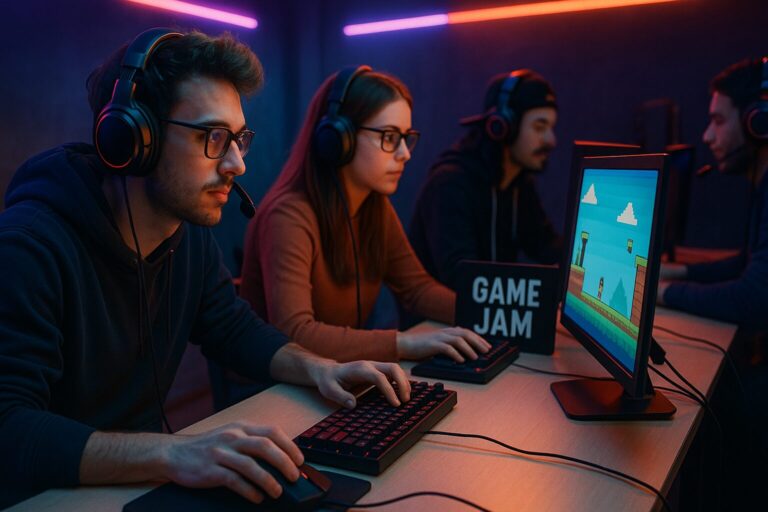
Starting out in game development is exciting—but it’s easy to fall into traps that slow you down or stop your project entirely. Most of these mistakes don’t come from lack of talent or motivation. They come from trying to do too much, too soon, or ignoring the basics.
Here’s a breakdown of the most common mistakes beginners make in game design—and how to avoid them.
1. Starting With a Game That’s Too Big
This is the number one killer of motivation. You want to make your dream game—an open-world RPG, a battle royale, or the next big multiplayer shooter. But the truth is, these kinds of games take teams of people years to make.
Why it’s a mistake:
Large projects require advanced knowledge of design, code, art, audio, and testing. You’ll hit roadblocks fast and feel overwhelmed.
What to do instead:
Start with a small, focused game. One mechanic, a few levels, one or two challenges. You’ll learn faster, finish more often, and build momentum.
2. Ignoring the Core Gameplay Loop
A lot of beginners get caught up in menus, story, or art before the actual gameplay works. The game may look great on the surface, but underneath, it’s not fun.
Why it’s a mistake:
The core loop is the backbone of your game. If it’s not fun, nothing else matters.
What to do instead:
Build a prototype of the main mechanic first. For example, in a platformer: make sure movement and jumping feel good before adding anything else. Don’t waste time decorating an unfinished foundation.
3. Adding Too Many Features
New developers often try to cram in everything: leveling systems, crafting, voice acting, cutscenes, branching dialogue. The result is a bloated, broken mess.
Why it’s a mistake:
Each new feature adds complexity, bugs, and testing time. You’ll burn out before the game is halfway done.
What to do instead:
Stick to one or two core features and make them solid. If you finish early, then you can consider adding something extra.
4. Designing for Yourself, Not the Player
Beginners sometimes design games that make sense in their head, but are confusing or frustrating to others.
Why it’s a mistake:
You already know how everything works. Your players don’t.
What to do instead:
Let others test your game early. Watch how they play. Don’t explain anything—see what they figure out on their own. Use that feedback to fix problems.
5. Skipping Playtesting
This is one of the most damaging mistakes: assuming your game works without letting others play it.
Why it’s a mistake:
You can’t spot problems if you already know how the game is supposed to work. Bugs, bad controls, unclear goals—all of it can hide in plain sight until someone new tries it.
What to do instead:
Test as early as possible. Ask a friend to play. Post a demo on a dev forum. Even five minutes of feedback can reveal major problems.
6. Overdesigning Before Prototyping
New developers often write giant design documents, map out every detail, and create complex lore before they even open a game engine.
Why it’s a mistake:
Plans are worthless if they’re never tested. Most ideas will need to change once you start building.
What to do instead:
Write down just enough to stay focused, then open your engine and start building the core mechanic. Let the game evolve as you test and learn.
7. Relying Too Much on Graphics
A beautiful-looking game with bad mechanics is still a bad game. Beginners often spend too much time on art and not enough on gameplay.
Why it’s a mistake:
Graphics draw people in—but gameplay is what keeps them playing.
What to do instead:
Use simple art or placeholder sprites. Focus on how the game feels first. You can polish visuals later or replace assets when the game is done.
8. Never Finishing Anything
A common pattern: start a project, get bored or stuck, abandon it, start something new. Repeat forever.
Why it’s a mistake:
You don’t improve much if you never finish. Each new project feels exciting at first—but real progress happens when you work through the boring or hard parts.
What to do instead:
Pick a small project and commit to finishing it. It doesn’t have to be amazing. It just has to be complete. That experience is more valuable than ten unfinished projects.
9. Avoiding Tutorials or Documentation
Some beginners try to figure everything out from scratch or watch five-minute YouTube clips instead of using proper resources.
Why it’s a mistake:
You miss key concepts or waste time solving problems that already have clear answers.
What to do instead:
Use the official docs and full-length tutorials:
Learning how to read documentation is a real skill—and it will save you hours.
10. Not Backing Up Their Project
Yes, it still happens. One crash or mistake can wipe out your entire project.
Why it’s a mistake:
Lost data means lost work—and often, lost motivation.
What to do instead:
Use GitHub, Dropbox, Google Drive, or a USB stick. Back up your project every day, or at least after major changes.
Final Thoughts
Game development is challenging, but most mistakes are preventable once you know what to look out for. Focus on building small, playable games. Test early. Keep your scope realistic. Learn from what doesn’t work, and finish what you start.
Avoid these beginner pitfalls, and you’ll be way ahead of the curve.
For more tips, tutorials, and beginner advice, stick with NoobGame.dev—we’ll help you avoid the mess and get to the fun part: making games that work.






